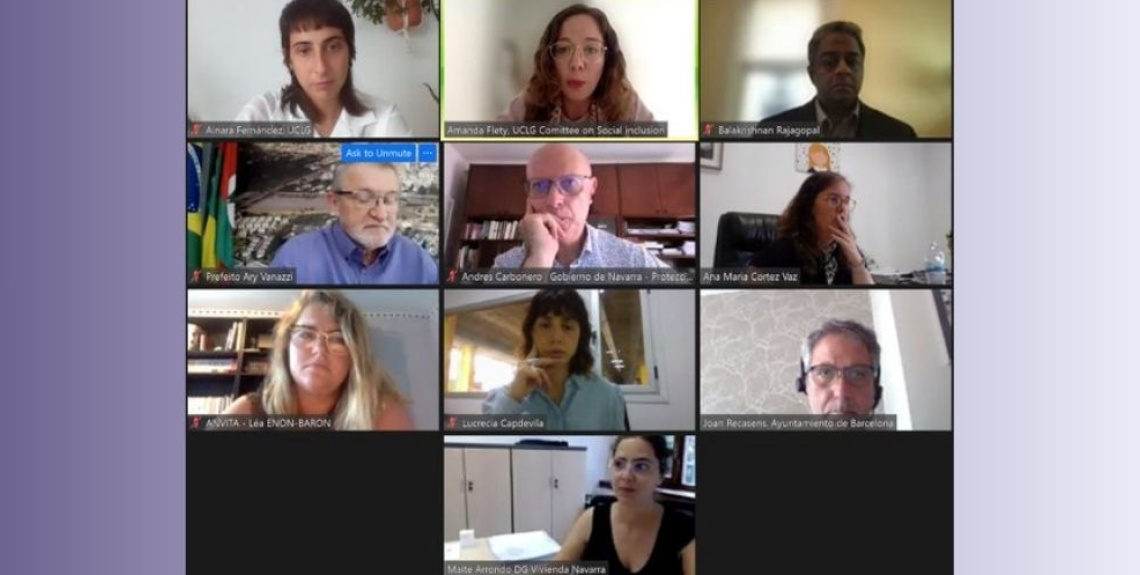On 20 September, UCLG and our Committee facilitated the online consultation "Cities for Adequate Housing" in the framework of the Community of Practice on Housing, which brought together around 50 local and regional governments, local government associations and networks from the Americas, Europe and Africa to share their experiences on homelessness and poverty. In addition, 23 UCLG members sent written contributions. The meeting was also attended by the UN Special Rapporteur on Housing, Mr. Balakrishan Rajagopal.
The aim of the online consultation was to co-construct the collaborative contribution of the organised membership to the joint report of the UN Special Rapporteurs on Housing and on Extreme Poverty: "Decriminalisation of Homelessness and Extreme Poverty", to be presented to the Human Rights Council. The contribution "The role of Local and Regional Governments in relation to the decriminalisation of homelessness and extreme poverty" is now available on the website of the United Nations High Commissioner for Human Rights.
Read the full contribution here.
«Homelessness is both a cause and a consequence of modern-day slavery»
The UN Special Rapporteur on Housing, Mr Balakrishan Rajagopal, helped to expand the notion of homelessness: it is not limited to people living on the streets, but encompasses all people living in precarious situations: squatting, in refugee camps or shelters, in involuntary shared housing, in housing with unsafe infrastructure, or all those who have been internally displaced as a result of violence.
«Homelessness is increasingly pervasive and requires complex solutions at the intersection of local public services»
Local and regional government participants also helped to feed into this expansion of the notion of homelessness. For example, they urged to trace the historical patterns that cause homelessness, such as the territorialisation of discriminatory and unequal development models, related to the colonisation and/or financialisation of housing, depending on each context. They also shed light on the emotional impact of homelessness, as people in this condition experience feelings of rejection and are more likely to suffer from mental health problems. Furthermore, they drew attention to housing as a fundamental issue for people's general wellbeing, as it is related to the quality of health, education and justice of the population at large.
More and more people are living in conditions of homelessness in cities and regions around the world, participants underscored. For this reason:
«Housing is a key action domain for LRGs because it directly impacts the ways in which people can enjoy their human rights in cities and regions»
Participating local and regional governments explained the solutions they provide, based on care, health, employment and other human rights. In addition, based on their experience, they agreed on a set of key conditions to enable their local action to address homelessness from their different local realities.
Summary of local and regional governments’ commitments and recommendations:
-
Acknowledge and address diverse forms of homelessness beyond visible street populations, recognizing housing exclusion and discrimination.
-
Prioritise housing as a critical action domain for local action, emphasising its impact on health, education, justice, and overall well-being.
-
Implement integrated approaches to economic and social rights, focusing on nondiscrimination, equality, and safety, avoiding punitive measures.
-
Adopt a comprehensive policy-cycle approach to homelessness, encompassing prevention, damage-control interventions, structural solutions, legal changes, and emergency housing.
-
Invest in permanent access to temporary housing, preventing extended periods of homelessness and facilitating adaptation for long-term homeless people.
-
Collaborate with the non-profit sector, utilise their expertise, and establish networks of local and regional governments for knowledge exchange and the promotion of alternative policy approaches
Key conditions to enable and strengthen local action:
-
Review national legal and resource-allocation frameworks to localise the housing agenda: enabling local and regional governments to revisit what local housing policies can entail for social inclusion, environmental, feminist and care approaches.
-
Ensure that international discussions about housing justice and ending homelessness actively include different local and regional governments who share their perspectives and experiences, given that the consequences of the global housing crisis differ across cities, have profound local impacts and require local solutions.
Participants:
-
Ary José Vanazzi; Mayor of Sao Leopoldo (Brazil);
-
Bongile Mbingo, Mayor of Ezulwini (Eswatini);
-
Daniel Jadue, Mayor of Recoleta (Chile);
-
Ana Maria Cortez Vaz, Councillor for Social Action and
Social Housing of Coimbra (Portugal); -
Hilary Gough, Councillor for Community Wellbeing and
Safety of Saskatoon (Canada); -
Joan Recassens, Deputy to the Housing Commissioner of Barcelona (Spain);
-
Maite Arrondo, General Housing Director of Navarra (Spain);
-
Luis Durán, General Manager of the Antioquia Housing Company of Antioquia (Colombia); Lucrecia Capdevilla, Manager of the Buenos Aires Presente Operation from the Buenos Aires City Council (Argentina);
-
Léa Enon-Baron, National Co-Director of the National Association of Welcoming Cities and Territories, ANVITA (France);
-
Fatima Razouki, Assistant to the Secretary General of UCLG Africa;
-
Louise Edwards, OHCHR Consultant on South African municipalities in response to extreme poverty and homelessness (South Africa).


